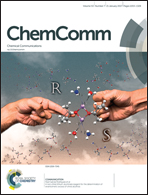Solid-state NMR at natural isotopic abundance for the determination of conformational polymorphism – the case of designed β-turn peptides containing di-prolines†
Abstract
The proton double quantum–carbon single quantum correlation experiment has been applied to designed peptides in the solid state in natural isotopic abundance. Analogous to nOe studies in solution, through-space double-quantum connectivities have been exploited to obtain the cis–trans conformational polymorphism of diproline residues occurring at β-turns in the peptides.



 Please wait while we load your content...
Please wait while we load your content...